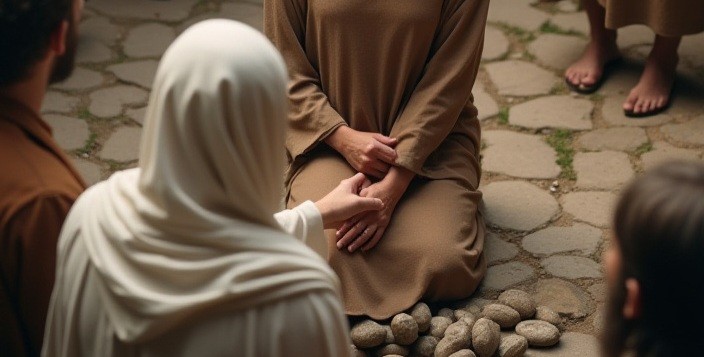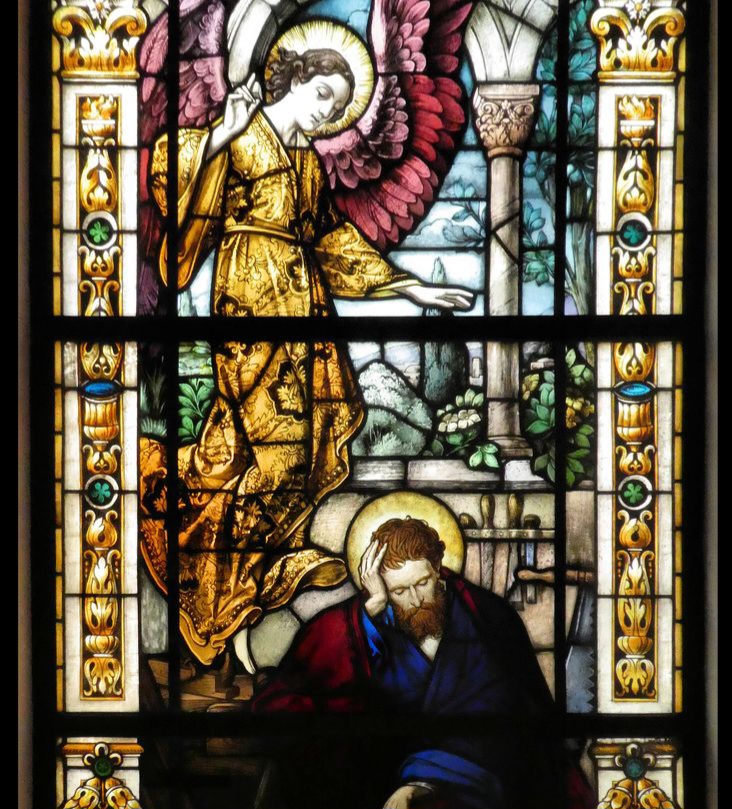Imagine what it was like for the woman caught in adultery (John 8: 1-11) to be dragged before Jesus into the midst of the Temple area, where he was teaching. Whatever the Pharisees’ intention in doing so, can we feel with her the humiliation that she was subjected to?

While adultery is not generally accepted in any society with marriage customs, under the Jewish law, the penalty for such infidelity was death for the woman (and it seems in some circumstances, for the man). So in addition to what it felt like to be publicly shamed, she must also have been terrified by the possibility of an imminent and cruel execution by stoning. Shame, terror, a sense of intense regret that this sin will mean the end of her life…
Now, let us consider what those men, including scribes and Pharisees of the law, must have been feeling as they encircled her, stones ready at hand, and demanded of Jesus a response. They came full of righteous indignation toward her, completely certain of their own justification, and prepared to execute judgement and punishment for her transgression. We have no idea of the whereabouts or consequences for the man who committed adultery with her, but clearly, he wasn’t their concern. Why?
We can’t say for certain, but in a patriarchal society where a man’s rights, power, and privilege come before women’s, justice favored the man in nearly every way. This was the case in the culture of Jesus’ time and place, and continues to be true for many societies today. But that didn’t stop Jesus from often challenging those customs, and instead, lifting up the dignity of women, children, and the foreigner. By pushing these boundaries, Jesus was perceived as threatening the respect for the Law, and the authority of the law’s guardians. He was seen as upsetting the social order, and no doubt, the religious authorities were trying to test Jesus to see how far he would go outside of their understanding of orthodoxy and obedience to the Law.
Jesus, though, seems strangely prepared to meet them in their test, and ready to transform this terribly tense situation. He had spent the night in prayer on the Mount of Olives, and he was already in the flow of his teaching to those gathered in the Temple. Jesus was already well aware that the resistance to his teaching was growing amongst the authorities. Whatever he was writing in the dust of the temple courtyard, it was also giving him time to stay grounded and clear headed in the midst of this dramatic moment. It was from this spacious and present state that this inspired intervention came: “you who are without sin, cast the first stone.”
With this simple line, he acknowledges the Law, the sin of the adulterous couple, the guilt of this woman standing before him, and their right to execute her. Yet. Jesus also holds up a mirror to everyone one of those men to examine themselves for their own moral purity, challenging them to deny her the very mercy each of them count on due to their sins.
None of this might be new to us, given our familiarity with the text from John. But how does this story speak to us today? What is our first reaction when we hear about the sin or the mistakes of others? Do we immediately “go in for the kill,” forgetting the many times and the many ways in which we have sinned in the past? Or do we see the sin and error of others with circumspection, mercy, and the intention of supporting others in mending their ways and learning from mistakes? As leaders, because of the power and influence we have in the lives of others, how do we want to conduct ourselves so as to come closer to Jesus’ way with others?
Let’s keep one another in prayer in these final weeks of Lent,




